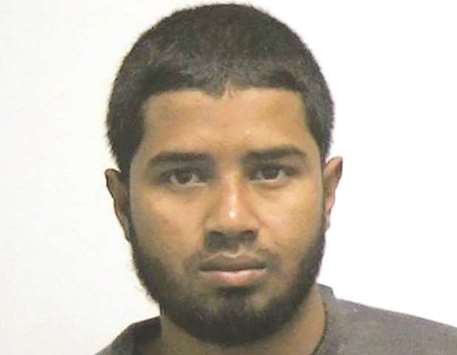Haider’s family had been worried when his son-in-law, Akayed Ullah, 27, missed a regular call to his wife on Monday.
Their worry only worsened when his wife screamed as she found online pictures of Ullah, down on the ground with apparent injuries to his stomach after the bomb ignited but failed to detonate.
“Even in our worst nightmares, we could not have foreseen this,” Haider, 62, said following two days of questioning by Bangladesh’s counterterrorism police.
Haider, a jewellery showroom accountant in Dhaka, said his family was stunned by the news that Ullah had been charged by the US with terrorism offences after he tried to detonate a bomb strapped to his waist in a pedestrian tunnel leading to Times Square, injuring himself and three others.
“There was never any indication he would do this. I think it’s a conspiracy,” Haider said.
He recalled being elated when Ullah’s family called from the US in December 2015 asking for the hand of his daughter, Jannatul Ferdous Jui, now 25.
The couple wed in Bangladesh the following month.
Jui continued to live in Bangladesh while she finished her studies and gave birth to their son, who is now six months old.
“We were very excited. I hoped my daughter would go to the US, and my son-in-law would then help get my son over there,” Haider said, meeting Reuters at his house in a middle-class neighbourhood in central Dhaka. “What else do parents want?”
The white-bearded Haider said he could not understand how Ullah, who had lived in the US since 2011, could have committed the attack.
“Only God knows what happened to him in America,” Haider said.
US President Donald Trump reiterated his call for tougher immigration rules following Monday’s attack, which came less than two months after an Uzbek immigrant killed eight people by speeding a rental truck down a New York City bike path.
Islamic State claimed responsibility for the October attack, while Ullah claimed allegiance to the militant group, according to US federal prosecutors.
Haider said he feared Monday’s incident could lead to a backlash against Bangladeshis living in the US.
Jui finished her bachelor of arts degree in accounting from a Dhaka college in March. When Ullah last came visiting in September after their son was born, they planned to get a passport for her to possibly join him in the US sometime in 2018.
“He spent most of the time with his six-month-old son when he came down,” said Haider. “He is not much of a social person. He does not really have friends, not into gossiping. He has never brought any friend to our house.”
Haider’s family has not been able to talk to Ullah since the failed bombing. Bangladesh police, meanwhile, have questioned Haider as well as his wife, daughter and his 22-year-old son.
Their phone call records have been scanned.
Bangladesh’s counterterrorism chief, Monirul Islam, told Reuters earlier they have found no links of Ullah with any militant group in his home country.
But the chief added that investigations were continuing and the family was under surveillance. “I no longer want my daughter to go to America,” Haider said. “I just want our son-in-law back.”

